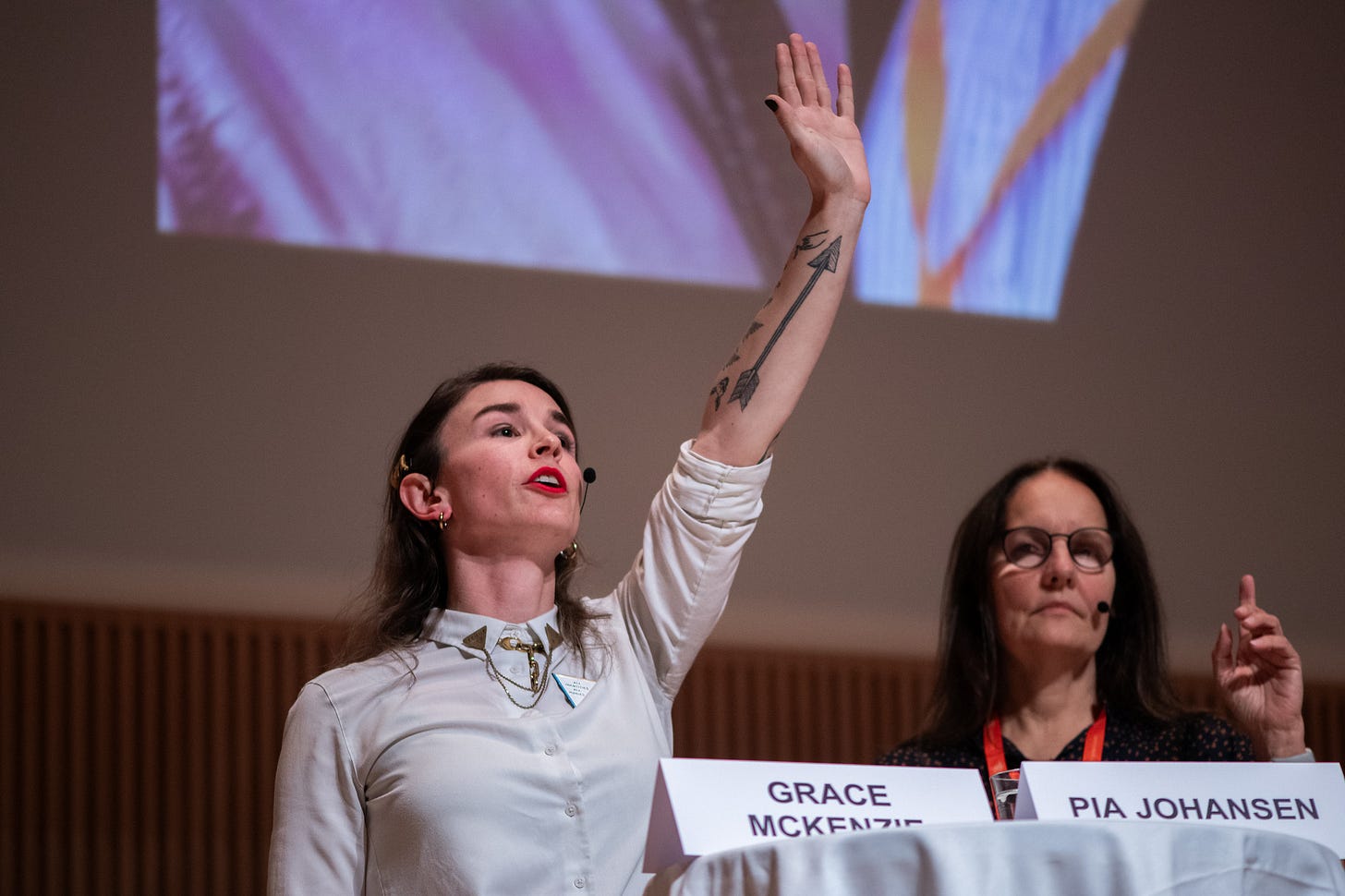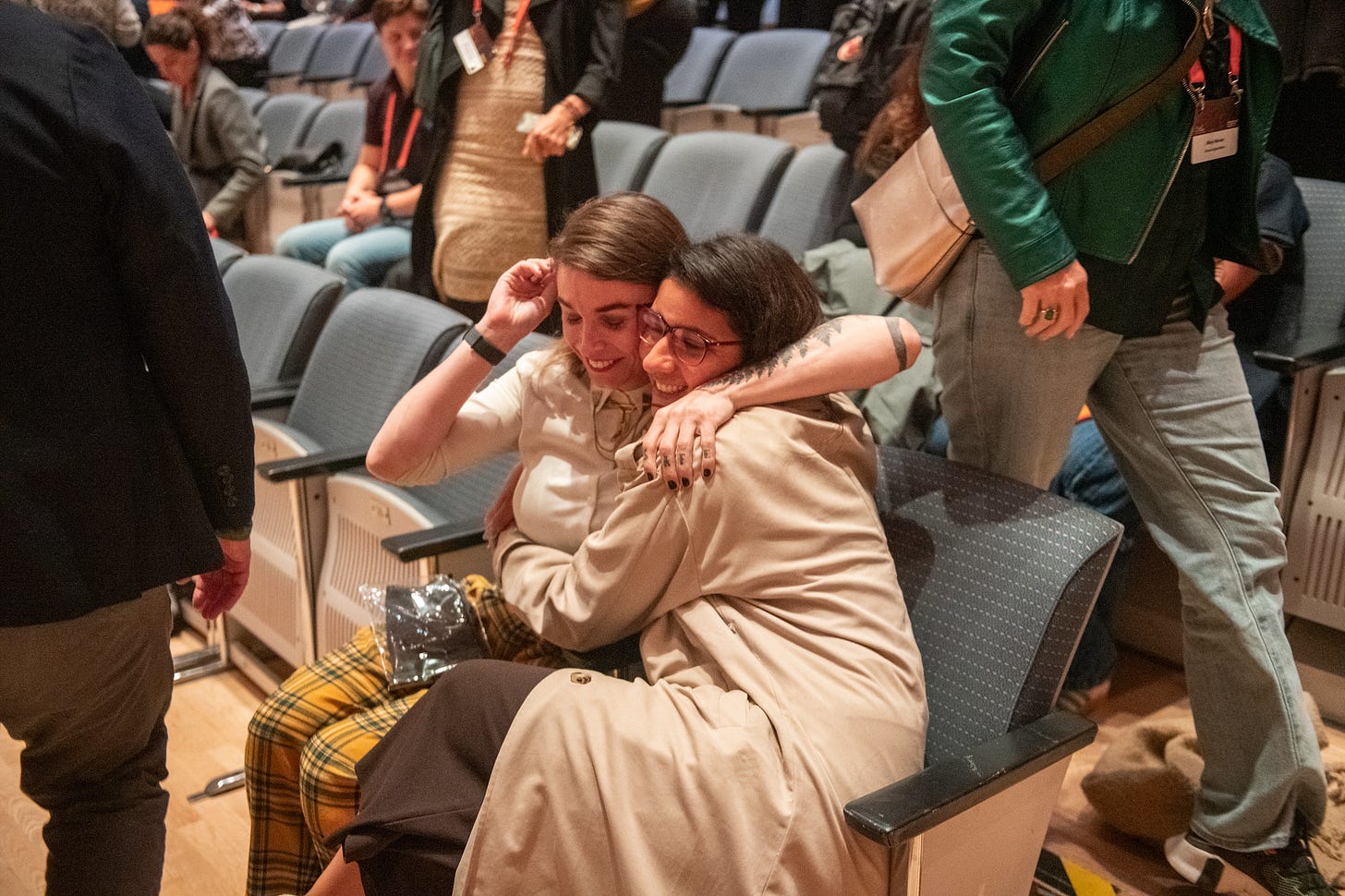The case for debating the other side
I had my reservations ahead of a debate about trans inclusion in women’s sports last week, but the outcome reminded me that there is merit (and catharsis) in dialogue and debating the other side.

Welcome to Sports Politika, a media venture founded by investigative journalist and researcher Karim Zidan that strives to help you understand how sports and politics shape the world around us. My mission is to offer an independent platform for accessible journalism that raises awareness and empowers understanding.
If you share this vision, please consider supporting my work by joining becoming a paid subscriber. I am currently running a special offer whereby you can secure a subscription at a 40% discounted price…forever.
The tension was palpable when I stepped into the auditorium in Tampere, Finland.
It was 8:00 pm on Monday, Oct. 6—the second day of the Play the Game 2025 conference—and hundreds of journalists, academics, athletes, and human rights activists were funnelling into the expansive room to attend a session I overheard being described as the “main event of the conference”: a debate about the inclusion of trans athletes in sports.
The session included two trans athletes: Grace McKenzie, one of the leading figures in the “Rugby For All” movement, and Joanna Marie Harper, the renowned researcher and scientist who specializes in studies of trans athletes. The roundtable also included European Aquatics bureau member Pia Johansen, and Roger Pielke Jr., a senior fellow at the American Enterprise Institute and publisher of the The Honest Broker on Substack.
Opposing the arguments for trans inclusion in women’s sports was Jon Pike, Professor of Philosophy at the UK’s Open University. Pike is heavily involved in prohibiting transgender athletes, especially trans women, from participating in sex-segregated competitive sports, and has advised many sports organizations and regulatory bodies on this topic including the World Anti-Doping Agency, World Rugby, British Triathlon, and the Sports Councils Equality Group.
As I took my seat, my heart began to race, beating so powerfully in my chest that I could hear the pulse in my ears. This didn’t feel like a main event to me. It felt personal.
As many of my longtime readers may already know, my beloved wife and partner, Jay, came out as nonbinary in 2021. I wrote about it in one of my early newsletters, and it remains one of the site’s most popular articles.
I am extremely proud of my wife, and fiercely protective of them. So when Stanis Elsborg, the Head of Play the Game and a dear friend of mine, first approached me earlier this year about his desire to host such a debate, my first reaction was of deep concern. Why did such a debate need to happen? And why give exclusionary voices a platform to spread their narrative to a wider audience?
And yet, after several conversations, Stanis had convinced me. He had included several trans voices and brought in other experts to counterbalance Pike. He planned to moderate the session himself and assured me that this would not devolve into a discussion about trans rights to exist, but instead an attempt at civil dialogue about a complex topic that few platforms are willing to accommodate.
It was with this goal in mind that Stanis began his opening remarks ahead of the roundtable. “Dialogue is the only way forward,” he argued.
Following Elsborg’ opening, he gave each of the panelists three minutes to deliver their opening statements. McKenzie spoke first, beginning with a show of hands. How many in the room personally knew a trans athlete? A fair number of people—several of the panelists among them—raised their hands. She repeated the request, this time asking who identified as trans or nonbinary. Only a couple of hands went up. Finally, McKenzie asked who in the audience was a trans-feminine athlete affected by a ban. No one raised their hand.
“I’d like everybody to look around and please keep the context of the dearth of hands in the air as we go through this conversation,” she said.

McKenzie described her experience as a trans woman who played sports both before and after her transition. She shared stories from her time playing rugby as a trans woman, all the way until a ban was implemented in July 2022, putting an end to her career. Johansen went next, describing how European Aquatics went about establishing its regulations for trans women.
Then came Pike, who began his remarks by thanking Stanis and Play the Game for the invitation, and their “persistence with the invitation in the face of demands that I be not platformed at this conference,” adding that it showed “decency.” He then proceeded to lay out the philosophical parameters for his argument against trans inclusion, insisting that the conversation could only operate within those boundaries.
Pike is one of the most prolific academics and voices when it comes to arguing against the inclusion of trans women in women’s sports. Over the past few years, he has authored or co-authored numerous studies and reports, including “Faster, Higher, Stronger” (Pike, Hilton & Howe, 2021 / published Dec 2021), which rejects identity-based classification and case-by-case assessments, instead proposing two sporting categories for competition: “Open/Female.” In a 2023 article for the Journal of the Philosophy of Sport, Pike critiqued the notion of “meaningful competition,” a term used in some inclusion policies, as insufficient for fairness.
These ideas form the basis for Pike’s theoretical views, which he reiterated during the debate. “Any male advantage, no matter how small, is unfair in female sport,” he argued.
Harper went next, and laid out where she fundamentally disagreed with Pike, arguing that significant factors such as the loss of muscle strength and drop in haemoglobin levels for trans women athletes should, in some sports, allow for a case-by-case assessment.
Pielke added even more nuance to the debate, drawing comparisons to athletes who run in the Olympics, and not the para-Olympics, using prosthesis when analyzing how to make case-by-case exemptions for trans athletes. He also cited doping statistics when making a case for the outsized importance anti-trans activists give trans participation in women’s sports when it comes to the issues of safety and fairness.
“Since 2000, there have been 76,000 Olympians; three have been transgender,” Pielke explained. “If you look at studies of the prevalence of doping in sport, the numbers are a fuzzy but they are in the tens of thousands of those 76,000. If we care about fairness in sport, we might want to go where fairness actually exists.”
Along with Harper, Pielke also dismantled the concept of “male advantage” for trans athletes, arguing that such distinctions are discipline specific, not sports specific. He also made sure to explain how right-wing political forces in the U.S. have distorted the conversation about trans athletes to whip up support from their base. Pike responded, agreeing with the premise but blaming “American leftists” and their support for trans rights for the Democrats losing the most recent U.S. presidential election.
“Donald Trump is no friend of women’s sports,” he said. “I am.”
Pike’s entire argument revolved around the idea that women must be protected from men in sports, though he wasn’t able to respond to Harper’s statements on the actual evidence that trans women who undergo hormonal treatment could lose so-called “male advantages” such as muscle mass and endurance. His remained firm in his presumption that men are stronger, faster and better than women in every instance, even when presented with evidence suggesting otherwise.
As the panelists continued to dismantle Pike’s arguments, the philosophy professor grew visibly flustered. He traded jabs with Pielke, whom he called “pernicious,” questioned whether McKenzie “had a brain,” and even took shots at the audience, calling them “muddled thinkers” living in a “bubble.” He deliberately misgendered McKenzie and other athletes, including Algerian boxer Imane Khelif, whom he referred to as a man. Though this led to jeers and chants of “hate speech” from members of the audience, order was quickly restored by Elsborg, who relied on his dry sense of humour to defuse the tension.

Despite a few tense moments, the debate remained largely civil, with each panelist given ample opportunity to make their case. This format seemed to work to Pike’s disadvantage: rather than controlling the narrative through academic abstraction or online provocation, he was compelled to defend his views in a public forum that demanded clarity, accountability, and respect.
For example, Pike repeatedly insisted that the rights of athletes to compete are fundamentally about ethics, and the female category should be “protected” and an open category offered. Pike used this distinction to claim that he was not trying to exclude trans athletes, even though the “open” category effectively amounts to a male category in all but name.
McKenzie was quick to counter Pike’s argument: “I do believe that if I undergo hormone replacement therapy, why should I not have the right to compete with athletes who are closer to — if not equivalent to, if not greater than — myself in terms of athletic performance?
“If you say I do not have that right, am I required then to compete against athletes who do inherently have a proven advantage over me, in the male category, for example? If your answer is no, that means your goal is actually to remove me from sports entirely.”
As the 90-minute debate unfolded, I felt myself begin to relax. My worst fears—that Pike would dominate the discussion with bad-faith arguments and make life difficult for the trans athletes—never materialized. Instead, I watched him struggle to defend his own positions, deflecting criticism through attacks on the audience and his fellow panelists. In the end, a few well-reasoned points and a commitment to civil discourse were enough to reveal Pike as a blustering ideologue—more interested in provocation than principle, with little substance beyond his philosophical conjectures.
For months, Elsborg had faced criticism for his decision to move forward with the debate. He was accused of platforming hate and of diminishing trans existence. And yet, he continued to champion dialogue as essential to the overall discourse. While I had my doubts about his approach at first, I left the debate in complete agreement with him, and thankful that he stuck to his guns.
Most trans women would understandably avoid the ordeal of debating their right to compete with someone like Pike. But McKenzie, as I later discovered, was different. When we spoke the next day, she told me that Pike’s work had been used to justify World Rugby’s decision to ban trans women from women’s contact rugby at the elite international level, which directly prohibited her from competing. For her, this debate was personal—a chance to finally face the man whose ideas had helped end her professional career.
“I’ve been waiting years for this moment,” she told me.

There’s a case to be made that, under the right circumstances, progressive voices should meet their opponents in open debate rather than insist on deplatforming them. When we refuse to share the stage, our opponents get to cast themselves as martyrs sacrificed at the alter of the so-called “woke mob” and champions of free speech. But when we invite them into the light of honest conversation, their arguments often fall apart. Most of them, after all, are more comfortable sniping from behind a screen than trying to standing their ground against logic, reason, and evidence.
This is not to suggest that debate is a one-size-fits-all solution. Safeguarding marginalized and vulnerable people from harm must always come first, especially when open discourse risks exposing them to harassment or retraumatization. Yet, when approached with care—through consent, structure, and skilled moderation—debate can serve as one of our most effective tools. It is not a cure-all, but part of a broader toolkit for understanding and persuasion. And when wielded responsibly, it can be a weapon worth unsheathing at the right moment.
As the session drew to a surprisingly civil close, I sought out Pielke to thank him for being the perfect counterbalance to Pike—and for dismantling his arguments so deftly. I told him how personal the discussion had felt to me. He thanked me for the kind words, then said something I won’t forget anytime soon.
“I just don’t like bullies,” he told me.
Nor do I, Roger. Nor do I.
Watch the entire session here.
Sports Politika is a media platform focusing on intersection of sports, power and politics. Support independent journalism by upgrading to a paid subscription ( or gift a subscription if you already have your own). We would appreciate if you could also like the post and let us know what you think in the comment section below.



This was a bullshit "debate," Karim, with all due respect. One right-wing philosophy instructor against multiple advocates for the opposite position--a real wolf pack--and a deeply hostile room. I hate to praise anyone from the Heritage Foundation, ever, at all, to any extent, but on that day he was the bravest person in the place.
How about instead of stacking the deck, the sponsoring body had allowed in some medical and scientific experts arguing the opposite of the side that it wished to see win? There are many. Was this "all the news that fits the tint," hmmm? Or unlike a paid right-wing ideologue, they had better ways to spend the time than accept this particular invitation?
There are many, many people who are liberals and disagree with you, and certainly many, many liberals who regret that Kamala Harris's attempts to tap-dance around this issue and not alienate the purity-progs who would use any excuse not to vote for a center-left Democrat anyway, helped to cost her the election. Particularly in the super-critical swing-state of Pennsylvania, where the Trump campaign hammered a broader anti-trans message based on her own old trimming statements, constantly, inescapably, for weeks before Election Day. The result is that all trans people have, I think, already been drummed out of the US armed forces, and their progress in other areas is being mercilessly reversed. Those moral victories get expensive.
I wouldn't care if the president, all of the senators and representatives, all the federal judges, and all of the governors were trans people. I honestly do not care and I have only love, so to speak, for brave trans people. But by gosh, post-pubescent trans women don't have a place in the walled garden of women's sports. I don't know why I'm bothering to argue about this even, given that the National Governing Bodies of the affected sports have been consensus-ing on "my" side anyway, so it's going to be moot. But color me unimpressed by this debate you wrote up.
Concerning the Heritage Foundation man, his tank has had a horrible influence on the USA, but I guess he's used to being unpopular, so he'll go anywhere to show the Christofascist flag and big deal. I doubt he thought he might convince anyone, but at the same time, his own side must have been high-fiving him for wading into a hostile forum.
I like the approach taken in my beautiful California last May by the California Interscholastic Federation (CIF), which governs high school sports. It had become apparent by May that the top contender in the high-jump, long-jump, and triple-jump events would be a trans girl, and the CIF wrote a new rule on the fly:
"On Friday, May, 30, if necessary, in the high jump, triple jump and long jump qualifying events at the 2025 CIF State Track and Field Championships, a biological female student-athlete who would have earned the next qualifying mark will also be advanced to the finals.
"Additionally, if necessary, in the high jump, triple jump and long jump events at the 2025 CIF State Track and Field Championships, a biological female student-athlete who would have earned a specific placement on the podium will also be awarded the medal for that place and the results will be reflected in the recording of the event."
On the day, the trans girl had a 67" leap in the high jump, the highest. The two cis-girls who tied one another and were just below her mark were also awarded first-place medals. They all shared a group hug on the podium; everyone cheered; and everyone went home. There were a handful of protestors, I think, but they were ignored. A couple of days later our great president was told about the situation, and bleated out some incoherent, unspecified threat to California for letting this happen -- but nothing came of that either, and you can see exactly how much the threats have shaken Governor Gavin Newsom, who was BTW a standout athlete in his own high-school years, basketball and baseball.
Naturally you can't just do this at a major event such as the Olympic Games, but the NGBs and the IOC call those shots. At the state level which is the summit of most youth-athletics careers, I think this was the right thing to do.
Really great analysis as always, Karim. It was a beautiful display of courage in the face of so many setbacks & attacks on the trans community.